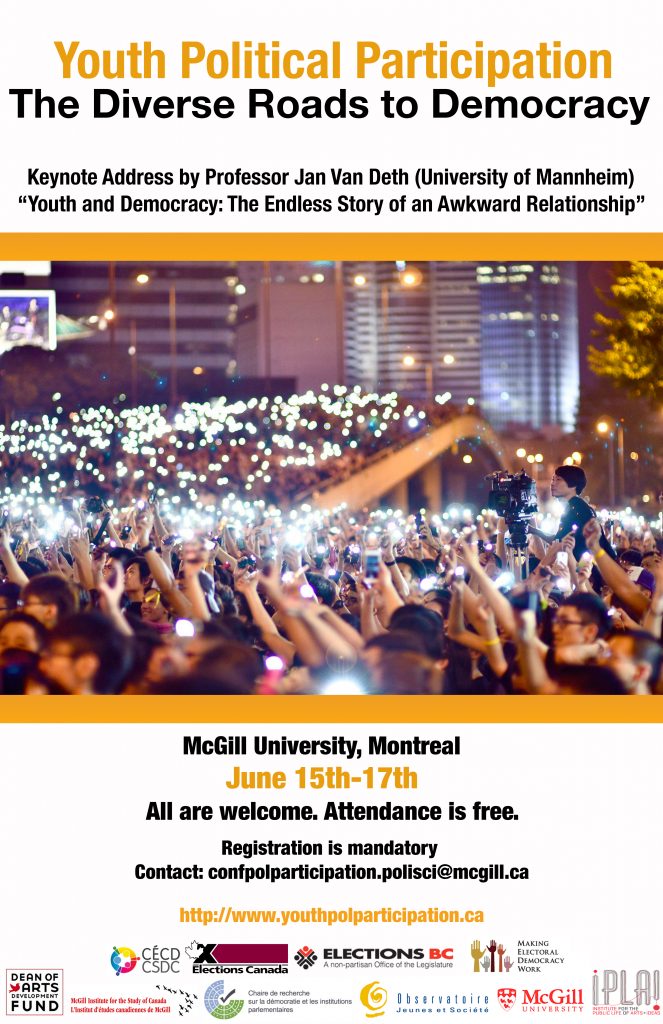
June 16th – 17th, 2016
Montreal, QC
McGill University
This academic conference will take place on the downtown campus of McGill University, on June 16 th and 17 th 2016. The conference will bring together experts on political participation, socialization and civic education from around the world, to discuss the state of the field, recent research findings, and to explore future avenues of research. The conference will showcase research from different national contexts and offer a comparative perspective on the contemporary challenges of youth political engagement in western democracies.
In addition to academic panels, roundtables will be organized with scholars, practitioners and public institutions working on issues related to youth and political participation. These intersectoral roundtables will offer a platform to discuss current practices and innovations in strategies of mobilization, communication and education.
All activities will be open to the public. Registration is mandatory for attendance.
Professor Jan W. van Deth (Mannheim University, MZES) will deliver the keynote address.
Conference organizer: Valérie-Anne Mahéo (McGill University, CSDC)
Conference committee: Valérie-Anne Mahéo (McGill University, CSDC), Ellen Claes (KU Leuven) and Eugénie Dostie-Goulet (Université Sherbrooke)
Conference Themes
Our era is characterized by democratic deficits and rising inequalities, which particularly affect the young generation. In this context, the conference seeks to further our understanding of how and why youth connect (or do not connect) with the democratic process, and to offer a reflection on policy avenues and guidelines for the future.
The conference will be structured around three themes, each addressing core lines of investigation in the explanation of young people’s political (dis)engagement.
Theme 1 – The Multiple Forms of Participation
In the 21 st century, young people from developed democracies around the globe tend to be moving away from traditional and electoral forms of participation. Meanwhile, rapid developments in information and communication technologies are offering them new platforms for discussing politics and engaging with political issues. However, there remains a gap in knowledge about how, why and to what extent youth steer clear of electoral democracy and embrace new and digital forms of politics. The panels of this section will seek to explain a wide range of participation forms (protest, online, institutional, non-electoral and more) and will further address the interplay between online, electoral and non-institutional modes of participation.
Theme 2 – Youth Diversity and Inequalities
Despite popular (mis)conceptions that today young people are all “politically apathetic” or “digital natives”, inequalities persist among youth with regards to their capacity and interest to be involved in politics and to use certain forms of participation. Do all youth turn their back on electoral politics, or are some groups of youth particularly likely to stay away from the ballot box? And why are some youth more disengaged than others? The panels of this section will analyze variations in forms of participation among young people who have different backgrounds and life experiences, while paying specific attention to those facing socio-economic hardships, first and second generation immigrants, and ethno-cultural youth.
Theme 3 – Connecting to Democracy: Institutions and Policies
The panels will address how different socialization agents, institutional actors and public policy programs affect youth’s interest and engagement in politics. Young people typically face various social and economic challenges in their transition to adulthood, which interfere with their involvement in politics. However, these diverse life experiences also offer the possibility for more meaningful ways to connect with politics. How do community groups and education institutions foster interest in the political process? How might they address barriers to participation? How can they create connections between politics and the different areas of life in which youth are invested? Furthermore, do public institutions and political parties address young people’s issues and acknowledge their various means of political expression?
For more information on the conference, registration details, and conference program visit: http://www.youthpolparticipation.ca

 Francais
Francais
